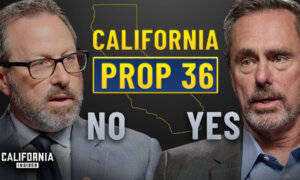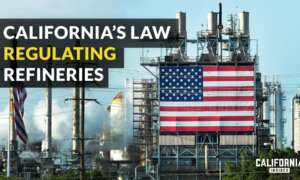A California bill designed to reduce greenhouse gas emissions would require big companies to verify and report emissions yearly, which critics say would hamper development and negatively impact the building industry.
Senate Bill 253, authored by Sen. Scott Wiener (D-San Francisco) and currently under consideration by the Assembly Appropriations Committee, would establish the Climate Corporate Data Accountability Act under the California Global Warming Solutions Act—passed in 2006 to limit greenhouse gas emissions.
Annual company reports would be available to the public via an online portal that allows citizens to analyze emissions statistics and compare company data year-to-year.
The bill also would require the California Air Resource Board to develop and adopt emissions reporting regulations for companies with revenues exceeding $1 billion annually, and the businesses they work with, on or before Jan. 1, 2025.
Beginning in 2026, and annually thereafter, such companies would be required to publicly disclose emissions data using standards established by the World Resources Institute—a global nonprofit focused on climate change—and the World Business Council for Sustainable Development—a global organization led by CEOs of more than 200 companies committed to sustainability.
The resource board would contract with one of the state university systems or an equivalent academic institution to analyze the data for 2026, the program’s first year, and report its findings by July 1, 2027.
Companies that fail to follow the mandate could face civil action, and the Attorney General is authorized by the bill to seek civil penalties for violations and noncompliance.
Currently, electricity generators, industrial facilities, fuel suppliers, and major greenhouse gas emitters are only required to report emissions to the resource board.
“These [current] requirements … miss many sources of corporate pollution,” Mr. Wiener, the bill’s author, wrote in support of the bill in the legislative analysis. “Without the same requirements for these corporate entities, California is left without proper information and will not be able to accurately regulate and reduce these emissions.”

Sen. Scott Wiener at an event in San Francisco, Calif., on Oct. 23, 2022. (John Fredricks/The Epoch Times)
Forced compliance is necessary given the lack of standardized data collection protocols and limited voluntary participation, he suggested.
“We no longer have the time to rely on massive corporations to voluntarily report their emissions and cannot afford any possibility that the emissions we are being told about have been altered or manipulated to ensure a positive public-facing appearance for a particular company,” Mr. Wiener wrote in the analysis.
He additionally said, the bill would “bolster California’s position as a leader on climate change” and “will allow for consumers to make informed decisions regarding their patronage of these corporations.”
SB 253 is a rework of prior, similar legislation—SB 260, also introduced by Mr. Wiener in 2021, which failed on the Assembly floor after passing through the Senate and clearing policy and fiscal committees in both houses.
Supporters include more than 50 organizations, including the California Environmental Voters and The Greenlining Institute, who suggest that the proposal will drive down carbon emissions and will set an example for the rest of the nation.
“This mandate of comprehensive climate pollution transparency would be the first in the nation and would establish a public right to know which companies are polluting our environmental commons, how much they are emitting, and if they are decreasing—or increasing—their climate emissions, offering a transparent and public way of verifying corporate claims of climate leadership,” the groups wrote in support in the legislative analysis.
Bill Would Delay Construction, Increase Costs: Critics
However, a coalition of over 60 organizations, including the California Chamber of Commerce and the California Building Industry Association, oppose the measure on the grounds that it will disrupt business and prevent timely development in the state by complicating operations and limiting competition.“Requiring reporting and limiting emissions associated with a company’s entire supply chain will necessarily require that large businesses stop doing business with small and medium businesses that will struggle to accurately measure their greenhouse gas emissions let alone meet ambitious carbon emission requirements, leaving these companies without the contracts that enable them to grow and employ more workers,” the groups wrote in opposition.
The bill was placed “on suspense”—where some bills that cost the state more than $150,000 are passed or killed without discussion—Aug. 16 by the Assembly Appropriations Committee, and its fate will be decided Sept. 1—the last day for fiscal committees to meet and pass bills.














